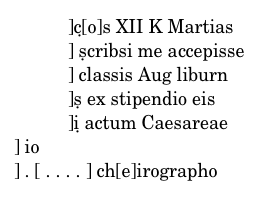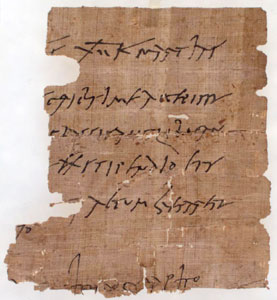Putting it All TogetherHaving read the text line-by-line, we can now look at the document as a whole. The transliteration of the text, before restoration or resolution of abbreviations, reads as follows:
As we read through the text we found that about half of each line is lost, but in many cases we could make educated guesses as to the content of the lost text. These guesses, put together, form the following reconstructed text (taken from Bruckner and Marichal):
This reconstruction cannot be expected to be perfect; the words and formulae inserted here are drawn from other texts which are similar, but by no means identical. However, the reconstruction gives us a much better idea of the form of the document and what it is saying. Translated into English, the contract reads:
While much of this text is conjecture, it is not far-fetched. The essential parts of the document can be found in the extant text: a statement of accepting something (likely a monetary loan); a reference to the fleet; a source of funds (stipendium); the geographic location; and the word cheirographo. Much of what has been lost is the names of the parties involved. The word tutela is used here interchangably with liburna; a tutela was the sculputre of a protective deity on a ship, from which vessels often drew their names. Contracts such as this one are relatively common among the papyri. Although it is impossible to tell how much of the text was lost on the bottom edge, it seems likely, based on other examples, that the contract would be recopied in Greek. While Latin was the official language of the military, most soldiers from Egypt would speak Greek as their first language. Please continue to the next page to complete this segment of Reading the Papyri. |
||
| Copyright 2004 The Regents of the University
of Michigan. Reading the Papyri is produced by the University of Michigan Papyrus Collection These pages designed and written by Terrence Szymanski. email: papywebmaster@umich.edu |

